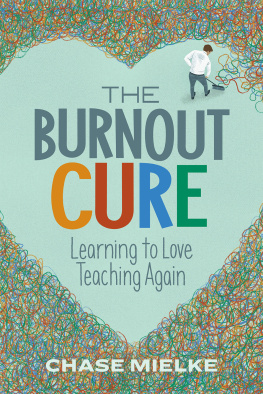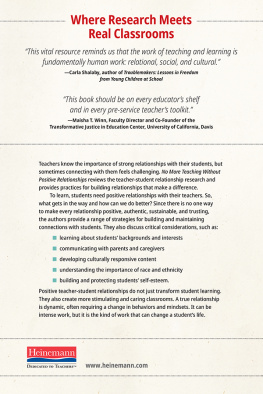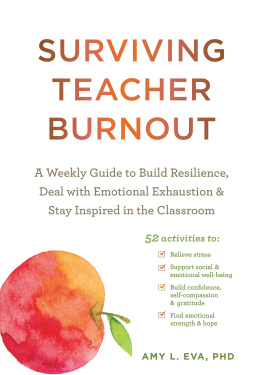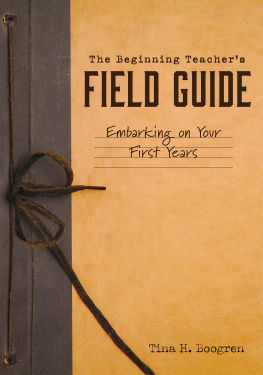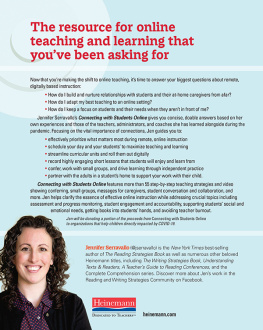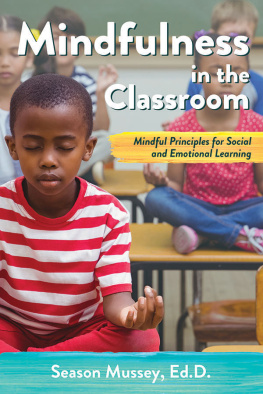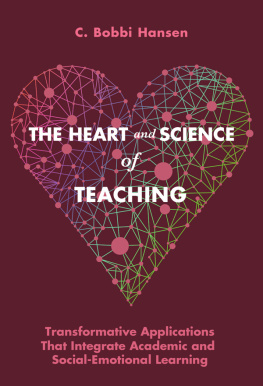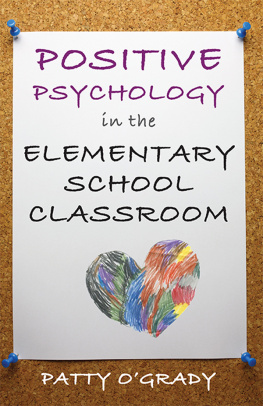Contents
Guide
Pages
Praise for The Burnout Cure
....................
Chase Mielke's profound and moving insights into the compassionate foundation of teaching will inspire those noble individuals we entrust with our childrenteachersto find passion and purpose. It is a must-read during these complex times.
Dacher Keltner
Faculty Director, Greater Good Science Center, UC Berkeley
Author, Born To be Good: The Science of a Powerful Life and The Power Paradox: How We Gain and Lose Influence
* * *
Mielke speaks to the reader with the heart of a teacher, the wisdom of an oracle, and the familiarity of a friend.
Readers will find research-based methodologies aimed at creating fundamental shifts in attitude, understanding, and behavior. A just-in-time antidote for the exhaustion afflicting our nation's teachers. An absolute must-read!
Weston Kieschnick
Senior Fellow, International Center for Leadership in Education, Denver, CO
Best-selling author, Bold School: Old School Wisdom + New School Technologies = Blended Learning That Works
* * *
Chase Mielke does the work: he teaches in a classroom like yours and mine. He writes about resolving teacher burnoutand how you can, too, with strategies vetted by both research and real life.
Through it all, Chase offers us a coherent framework for understanding how to build flourishing lives inside and outside the classroom. This is a guide I've been looking for.
Dave Stuart Jr.
Best-selling author, These 6 Things: How to Focus Your Teaching on What Matters Most
* * *
Chase Mielke is an exceptional educator and an exceptional human being, demonstrated by the authentic way he shares his personal story. His heartfelt writing will resonate with teachers as he shares with readers how to not "simply survive as an educator but thrive, personally and professionally."
Bobbi DePorter
President, Quantum Learning Network / SuperCamp
Author of numerous books on teaching and learning and coauthor of Excellence in Teaching and Learning: The Quantum Learning System
Dedication
....................
To Bob
For giving me the permission and support to take risks
Introduction
....................
I'm sure you've seen multiple representations of teaching cycles, meticulously crafted with buzzwords: formative assessment; performance task; progress monitoring; data, data, data. But can we talk about the real teaching cycle? For many teachers, it looks like this:
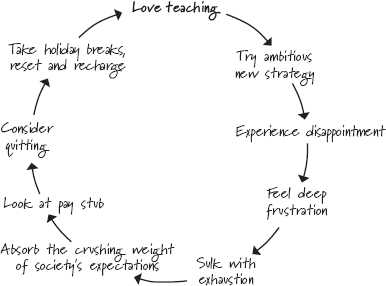
Your cycle of teaching might have additional phases, such as "Parent blame-storm," "Legislative letdown," and "Loss of respect and autonomy."
Though we experience different types of ups and downs, every educator experiences moments of doubt, defeat, and exhaustion. At a minimum, these moments distract us from our love of teaching. At most, they make us want to quit.
Have you been there? Questioning your decision to teach? Ready to turn away from this career that used to be a calling? If so, you're not alone. The statistics around teacher burnout and attrition aren't encouraging. Between 8 and 15 percent of teachers leave the profession every year (Ingersoll, Merrill, & Stuckey, 2014), and around 40 percent of new teachers will leave the profession within five years (Ingersoll, 2012).
Just a few years ago, I stood toe-to-toe with the quitting phase of teaching. Ten years into the career, I had had enough. I was brushing up my rsum, job searching each night, and looking into every alternative career route possible. You can probably guess some of the many factors that had burned me out:
- Challenging, disrespectful students
- Absurd pressures around testing
- Negotiation battles
- Stressed-out colleagues
- The dichotomy of uninvolved and overinvolved parents
- Adolescent cruelty and lack of integrity
Other factors weighed on me, too. I trudged through each day and came home to a colicky newborn and a wife who was fighting postpartum depression. My emotional bank was depleted, yet I sluggishly went back to work every day, wondering why I was doing it.
So, why am I writing a book about "thriving" when I was clearly declining not long ago? Because I rallied.
It was either coincidence or irony that, amid languishing personally and professionally, I was teaching a positive psychology class that I had developed on human flourishing. The class is an elective open to all students at the high school where I teach, but it's designed to target students who are languishing in their livesasking the same questions, at the teenage level, about the "why" of adversity and the "how" of happiness that we ask as adults.
I'm convinced that if I hadn't known about the research related to positive psychologyif I hadn't practiced what I taught to my studentsI would have bitterly walked away from my calling and left the field of education. Instead, I engaged every mindset, every cognitive shift, every research-based practice I knew and lifted myself back to loving my job.
Although counteracting the desire to quit required the deepest commitment, this was not the first time I had to rally against the temptation. I have faced burnout, exhaustion, and the urge to give it all up multiple times. No doubt you have too. But I have no doubt that you also know, somewhere deep in your mind, that education is worth the effort and the struggle.
This book is a response to a critical question: How do we refuel, reenergize, and reframe to be our best as teachers so we can give our best to learners? I've spent over a decade studying and teaching positive psychology, which essentially posesand answersthis question more broadly: What research-based practices help people and communities flourish? My purpose in writing this book is to share what I've learned to help you rally when you feel burned out, to not simply survive as an educator but to thrive, personally and professionally.
The practices in this book are more than just research-based ideas. They are my lifelines when I have a rough day, my lenses for realizing why teaching is my calling. Each practice has been through the "real life and rigorous research" test. In other words, it is supported by a multitude of peer-reviewed research studies and it helped me (and countless others) improve well-being in real life, particularly regarding teaching and coaching. Every chapter will help you understand the gist of the concept and then outline some specific strategies, practices, and resources I've used personally and taught to thousands of students and educators.
But I can't simply throw a bunch of random concepts at you. We need a framework, a model, adare I say itcycle to help us improve our well-being more methodically.
The Empowered Thriving Model
Just as there are countless representations of the cycles of teaching, there are countless models for learning. The model I'm offering, which I call the "Empowered Thriving Model," is one of those implicit models that is a part of almost everything we do, whether it is teaching a student about energy convergence, helping a colleague with a pedagogical strategy, or trying to shed those holiday calories.

